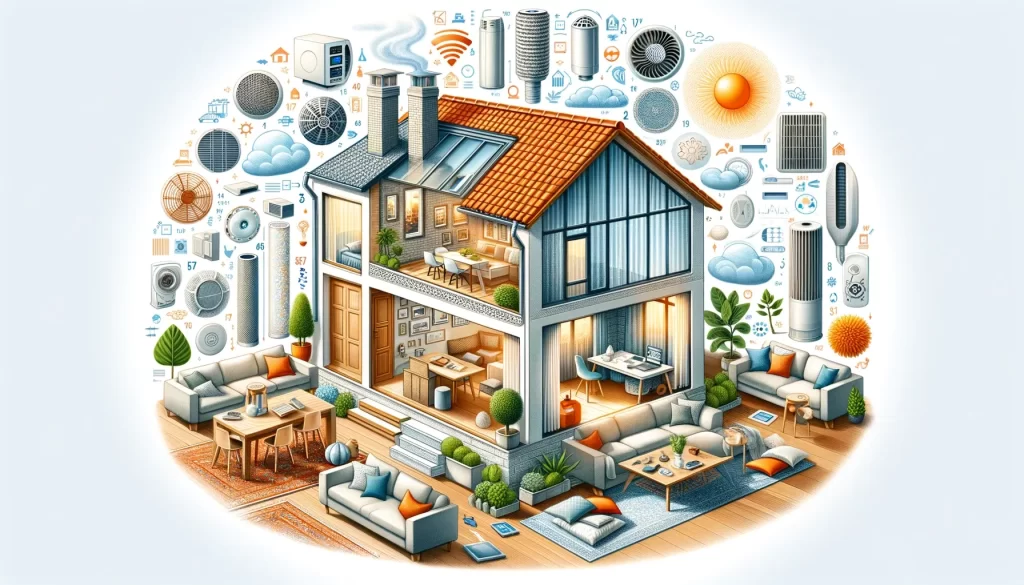Understanding the Importance of Proper Ventilation With Quality Air Filter Housings
Table of Contents
When we think of a comfortable home, we usually envision puffy pillows, throw rugs, and wall hangings. While these can make a room feel cozy, the most important factors for comfort are often the ones we don’t see.
One of these factors is ventilation. Ventilation helps provide fresh air, reducing harmful pollutants and eliminating odors. It also controls excess moisture and humidity, preventing mold or mildew growth.
Our team of experienced technicians is dedicated to keeping your home cool and comfortable year-round. Whether your AC unit needs a simple tune-up or a major repair, we’ve got you covered. With our prompt service and competitive pricing, you can trust us to get the job done right. Don’t let a malfunctioning AC system ruin your day – contact us today for fast and efficient air conditioning repair snohomish.
Air Filtration
Air filtration is a vital part of any ventilation system. Whether it’s for removing dust and lint from cooling coils, preventing odors and harmful smoke in bathrooms or kitchens from spreading throughout the home or keeping bacteria, viruses, mold spores, VOCs, and fine dust out of food production facilities, high-quality commercial air filters are essential to maintaining healthy indoor air quality.
The ability of commercial HVAC air filter housing to trap pollutants and particles is measured by their Minimum Efficiency Reporting Value (MERV). This rating is determined by an independent testing laboratory using staining methods that measure how well the filter captures small particles.
Natural forces (winds and thermal buoyancy force of differences in indoor and outdoor air density) drive ventilation through open windows, doors, and purpose-built openings like solar chimneys and wind towers, but mechanical fans are also used. Depending on the climate and building design, these help increase or decrease the ventilation rate. Proper ventilation reduces indoor humidity, provides fresh air, regulates temperature, and controls airborne contaminants to create a healthy environment, helping improve productivity and reducing sick leave and early product spoilage in manufacturing settings.

Energy Efficiency
Ventilation provides fresh air while removing pollutants, moisture, and odors. It also regulates indoor temperatures and humidity levels, decreasing the need for excessive heating or cooling. This results in a more comfortable environment and increased productivity for building occupants.
Proper ventilation is also required to prevent mold growth in an apartment. To prevent mold growth, it’s essential to ensure proper airflow in each room by regularly cleaning ductwork and addressing any water leaks as soon as they occur.
In addition, by opening windows during pleasant weather conditions, you can increase your ventilation and help improve the indoor air quality. Adding vents and louvers to your home can also increase fresh air flow while reducing the need for artificial cooling. Finally, ensuring the kitchen and bathrooms have proper venting can help keep odors, excess moisture, and harmful smoke from lingering in your living space. Increasing the natural light in your home can also reduce your need for artificial lighting.

Noise Reduction
Sound ventilation provides fresh outdoor air, removes stale or polluted air, and regulates temperature and humidity levels. It also helps control airborne contaminants and promotes good indoor air quality.
Ventilation is also essential to help keep virus particles from spreading throughout your home. Opening windows and using fans will help clear these particles from your home faster.
Indoor air pollution causes various health difficulties, including respiratory troubles, allergies, lethargy, and headaches. Prolonged exposure to some substances, such as radon and carbon monoxide, may lead to cancer or death.
Building materials are rated for their ability to insulate against airborne noise with weighted sound reduction index (Rw) and impact insulation class (IIC). Consider these factors when buying or designing your home. Try to minimize noise transfer between properties by cycling or walking, purchasing quiet cars, and shopping locally to reduce freight distances. Design your homes and courtyards to minimize noise transfer by providing barriers and sound-absorbent materials.
Indoor Air Quality Ventilation
With proper ventilation and the elimination of stale indoor air, you can help prevent the growth of mold, dust mites, and other fungal spores that can trigger respiratory symptoms. Long-term exposure can cause significant health problems such as asthma, lung illness, and heart disease. Short-term exposure can cause various symptoms, such as coughing, sneezing, itchy eyes and nose, headaches, and fatigue.
Ventilation can also reduce odors and improve circulation to bring fresh air in, eliminating stale, polluted indoor air. Additionally, ventilation can help control temperature and humidity.
However, be careful with increasing outdoor ventilation on days when there are high pollution concentrations. This may only sometimes be a beneficial strategy for protecting indoor air quality since outdoor pollutants can infiltrate your space, too. For this reason, source control is often a better and more cost-efficient approach.



